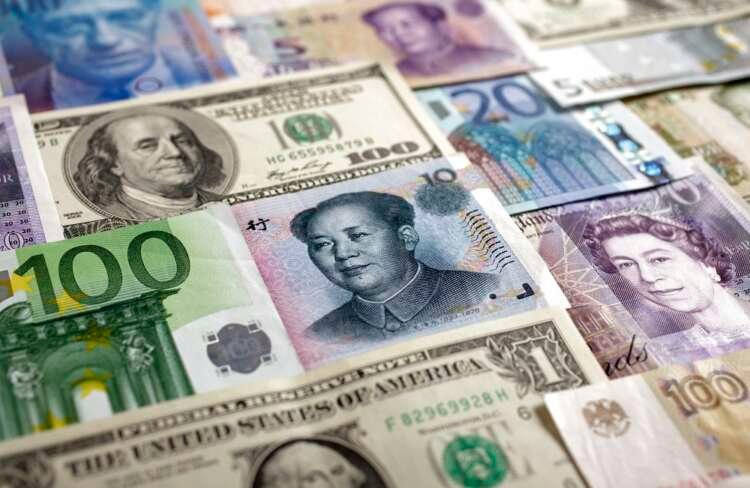Global FX trading hits record $7.5 trln a day – BIS survey
Published by Jessica Weisman-Pitts
Posted on October 27, 2022
4 min readLast updated: February 3, 2026

Published by Jessica Weisman-Pitts
Posted on October 27, 2022
4 min readLast updated: February 3, 2026

By Marc Jones and Alun John
LONDON (Reuters) – Currency trading has hit a record $7.5 trillion-a-day, a comprehensive new study has shown, with the dollar retaining its global dominance but some signs too that London’s position as the world’s top trading hub is being eroded by Brexit.
The triennial survey carried out by central bank umbrella group the Bank for International Settlements collated data from April as markets were grappling with the Ukraine war and early stages of the aggressive U.S. interest rate hike cycle.
The headline $7.5 trillion daily turnover figure marked a historically modest 14% increase from the $6.6 trillion recorded in 2019 and was driven by a mix of higher foreign exchange spot, swaps and forwards market volumes.
Turnover of FX swaps accounted for 51% of global turnover, up from 49% in 2019, whereas spot trades fell to 28% from 30% and the share of outright forwards remained at 15%.
This “was the lowest triennial growth rate in all but two Surveys since 2004,” the BIS said, “despite data collection coinciding with heightened FX volatility due to changing expectations about the path of future interest rates in major advanced economies, rising commodity prices and geopolitical tensions following the Russian invasion of Ukraine”.
The survey, which is viewed as the most comprehensive overview of global currency market trading, collected data from more than 1,200 banks and dealers in 52 countries.
Unwavering U.S. dollar dominance meant it was involved in 88% of all trades – a level it has maintained for the past decade, while the euro remained the second most actively traded currency despite a small drop in its share to 31%.
Other top currencies such as the Japanese yen and British pound maintained their near 17% and 13% respective shares, while the Chinese yuan saw the biggest rise to 7% from 4%, which hoisted it to fifth in the overall rankings from eighth.
Rouble volumes were notably not included this time around after Russia’s BIS membership was rescinded after the invasion of Ukraine, although it share had been less than 1% in 2019 anyway.
LONDON FALLING
The demise of Libor and Brexit look to have reshaped the world’s over-the-counter (OTC) interest rate derivatives market, where daily turnover dropped to $5.2 trillion from $6.4 trillion in April 2019.
Banks and companies use interest rate swaps to insure themselves against unexpected moves in borrowing costs.
But after banks were fined for trying to rig the London Interbank Offered Rate or Libor, most of the rate’s permutations across five currencies were scrapped at the end of 2021 and replaced with rates compiled by central banks.
“The most significant factor contributing to the decline in turnover is the continuing shift away from Libor for major currencies,” the BIS said.
There were also shifts in activity after Britain completed its departure from the European Union at the end of 2020.
It remained the most important currency trading location globally, with 38% of global turnover, although that was down from 43% in 2019.
Foreign exchange desks in London also still recorded the highest turnover of interest rate derivatives, at $2.6 trillion, or 46% of global ‘net-gross’ turnover, but this too was down from 51% .
“Turnover in U.S. dollar swaps has partially shifted from sales desks in the United Kingdom to the United States and Asian financial centres,” the BIS said, although it is uncertain whether it is a fundamental long term shift.
“Similarly, turnover in euro swaps has shifted from the United Kingdom to the euro area.”
Brexit meant that EU banks could no longer trade OTC derivatives in London.
Turnover in euro interest swaps grew the most over the three years surveyed by BIS, reaching $1.3 trillion per day in 2022, up 38% from April 2019.
Turnover of euro rate swaps in Britain fell 18% to $1 trillion over the three years, while turnover by dealers, particularly in Germany and France more than tripled, from $124 billion in 2019 to $385 billion in 2022.
Asia’s financial hub Hong Kong saw its share of FX trading dip to 7% from 8%, which the report said was likely as result of COVID-19 restrictions.
The city only removed mandatory quarantine for incoming travellers in September and still has restrictions on the size of group gatherings, rules that have contributed to an exodus of international bankers.
Hong Kong’s regional rival Singapore, in contrast, increased its share of global turnover to 9% from 8%, though both hubs remain among the top five global venues.
(Additional reporting by Huw Jones; Editing by Tomasz Janowski)
Foreign exchange trading, or forex trading, involves buying and selling currencies in the foreign exchange market to profit from changes in exchange rates.
The Bank for International Settlements (BIS) is an international financial institution that serves central banks and fosters international monetary and financial cooperation.
FX swaps are contracts in which two parties exchange currencies at a specified rate and agree to reverse the exchange at a later date.
A currency trading hub is a financial center where significant foreign exchange transactions occur, often influenced by factors like regulations and market conditions.
The U.S. dollar is the most widely used currency in global trading, accounting for a significant percentage of transactions due to its stability and liquidity.
Explore more articles in the Trading category











